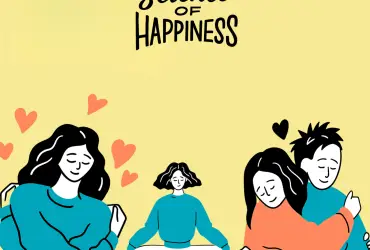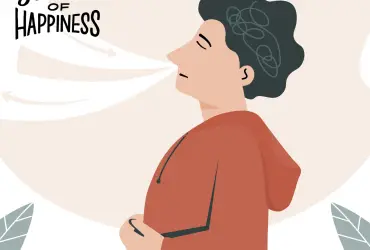KRISTA TIPPETT I was working in a toxic corporate culture for a number of years. And I started to realize that I was changing, that I was not a person I wanted to be at work. I had become such a fighter, I was in such fight mode that you then end up also fighting with people you care about.
When I was stressing out and when I was stressing out people around me, there was a place in my body where I could like, feel it, like this rock.
You know, it was like a physical being. It was a solid mass. And it’s a terrible way to live. What was interesting is I totally realized it was about, what I was feeling in my body. That it was a physical thing that was going on like, the physical presence you know, that I was walking around with it. I did not want to be feeling that way.
DACHER KELTNER As host of the award-winning radio show and podcast On Being, Krista Tippett has inspired listeners for years with her thoughtful discussions of faith, meaning, and morality. But even she can succumb to intense stress. And as she learned, that kind of toxic stress can wreak havoc on our minds and bodies.
On each episode of our show, we have a guest try out a practice designed to boost happiness, resilience, kindness or connection. And then we explore the science behind it. Krista, thanks so much for being with us.
KRISTA TIPPETT Oh, I’m so glad to be with you.
DACHER KELTNER So Krista, one of the things we’re doing is we at the Greater Good Science Center, we have this array of happiness practices. What did you choose?
KRISTA TIPPETT I chose the body scan meditation.
DACHER KELTNER Why did you choose that?
KRISTA TIPPETT Well, I think because I have really come to this place where I don’t actually think of the fullness of spiritual life as possible without being grounded in your body.
DACHER KELTNER Yeah.
KRISTA TIPPETT I think the extent to which we can apprehend whatever mystery is, like we can have that experience of mystery is limited by how much we are in our bodies, which in itself is a mystery. So for me, like the growth edges of my spiritual life in recent years have all been about inhabiting my body, they have been about being embodied in everything that goes along with that. Rest and pleasure and physical companionship, friendship, sitting around tables, eating with people. And as much as like my yoga or you know, things I do for my body.
DACHER KELTNER So what did you do for this particular body scan?
KRISTA TIPPETT So I had actually done body scan meditation years and years ago, probably before I had all these heavy thoughts (laughs). Before I actually started inhabiting my body the way I do now. So I actually thought it would be interesting to do it now, and also to not be kind of quiet at home, but bring it into the middle of a working day.
DACHER KELTNER Excellent. And what specifically did you do?
KRISTA TIPPETT I don’t have a desk in my office; I have a couch. So I actually laid down on that and did the body scan meditation kind of reclining. So I had to close my door to my office (laughs). And you know, just lay down and close my eyes and started very simple, you know, I was listening to a recorded guide.
(clip) Begin by bringing your attention into your body.
KRISTA TIPPETT It’s getting still, it’s getting comfortable and it’s tuning into your breathing.
(clip) Then take a few deep breaths.
KRISTA TIPPETT And then starting to tune into your body
(clip) Feeling the weight of your body.
KRISTA TIPPETT And if your feet are touching the floor, or the backs of your legs are on the surface on which you’re lying, and kind of feeling where your body is touching the ground, and for me it’s kind of noticing that and, and kind of breathing into it, and dropping into those places.
DACHER KELTNER And what would you tell a friend is the purpose of that mindfulness exercise?
KRISTA TIPPETT: Oh, gosh. I mean in a larger sense I think it’s about connecting ourselves up. I think, like, you know, you move through the day like propelled by your brain and by whatever you’re thinking. And the things you’re thinking that you don’t even intend to be thinking. And not noticing your body. And it’s about kind of settling in your body, and connecting your mind, and your breathing, and your heart. And really the rhythm of yourself with your feet on the ground, and the fact that you’re breathing in air.
DACHER KELTNER Wonderful. I, by the way, I just launched into a body scan as you describe (they laugh). Like man, my feet feel better than they’ve in a long time (laugh again). You know, one of the things I think is really important to bear in mind about these mindfulness exercises is you know, you can insert them really quickly into really busy days like you’re probably experiencing right now. So if you were to kind of tell a friend who seems a little overwhelmed just to do what you just did, what what would you tell them to do, as a practice?
KRISTA TIPPETT Well I might start out by telling them that it probably wouldn’t sound like it would work. And that when I when I set out to do this I wasn’t sure it would work because I think I would have been skeptical.
You know, I would say like if you can grab five minutes, ten minutes and close the doors and you know, not be rushing between what you just did and what comes next. You know, to do that and to feel that and that you will in fact move through the rest of your day differently.
DACHER KELTNER Yeah, you know I am struck at how applicable or how useful the body scan is. You know, I remember being in a long line at a security checkpoint in an airport and I was like, ‘OK let’s try it here.’
KRISTA TIPPETT Really?
DACHER KELTNER Yeah, I think it’s important to bear in mind how useful it is. Since one of the themes today is the body, What did it feel like for you as you dropped into your body?
KRISTA TIPPETT Well, you feel heavy. But it’s it’s not like being way down. It’s like being held. You know, here’s an image that comes to mind for me. Years ago I interviewed Parker Palmer about depression and he mentioned a psychiatrist he saw who said, ‘Parker could you stop thinking of your depression as an enemy who wants to defeat you. And think about it as a friend who wants to bring you down to ground in which it is safe to stand?’
And there’s a little bit of that feeling with the body scan of like, I’m sinking. I am now resting on the earth, right? Like where I always needed to be anyway, rather than floating, flitting above it. I think we’re going to learn more and more that if we can get in touch with how feelings, memories, experiences, problems are lodging in our physical selves and we can address our physical selves. You know, we may be able to do so much healing through our bodies.
DACHER KELTNER Could not agree more.
KRISTA TIPPETT Right? That we thought we had to invest years or take medicines.
DACHER KELTNER Yeah. Coming out of the mindful exercise that you did, were there other kinds of subjective dimensions that shifted or that you saw in your life that sort of were lasting effects of this practice?
KRISTA TIPPETT So what to me is magic about these practices and this is certainly true of the body scan is that it honestly is a form of instant gratification which is (they laugh). You know, all the things we think we do to get happy.
DACHER KELTNER Wait, I thought it was spiritual transcendence!
KRISTA TIPPETT I know, and it’s actually, you get to have it all because the thing is even if you’re not doing it right, it is instant. There is this transformative thing. And what I mean is, and you know what I’m saying, it’s like it stays with you even if it didn’t feel like a particularly successful—as I said, I didn’t necessarily feel, you know, 150 percent relaxed because I still had this day ahead of me.
But it does change you. There’s something that shifts inside and you do get to carry that around with you. I don’t use the word happiness lightly. But but whatever this is, human flourishing, joy, our ability to to be resilient, our ability to enjoy our lives. And it’s kind of like science is kind of reclaiming this spiritual work but also as an essential and serious part of the human experience. But you’re not going to put it back in the same old box, right?
DACHER KELTNER Yeah, yeah, no. It’s gotta change.
KRISTA TIPPETT So that’s the moment we inhabit. And it’s it’s basically just full of all this amazing possibility.
DACHER KELTNER Well Krista Tippett, I want to thank you for this incredible conversation about the delights and mindful delights we can find in the body. And I want to thank you for being a happiness guinea pig on the Science of Happiness (she laughs). Thank you so much.
KRISTA TIPPETT Dacher, thank you!
DACHER KELTNER If you want to try body scan meditation, and other practices like it, you’ll find simple instructions on our website, Greater Good in Action. That’s GGIA dot berkeley dot edu.
Today at the Science of Happiness, we’re going to bring in another science expert to talk about the body scan and different kinds of meditation practices and how they affect the brain. And so, it is a real delight to welcome Wendy Hasenkamp to our show. Wendy holds a Phd in neuroscience and is the Science Director at the Mind and Life Institute. Wendy, it’s great to have you on our show.
WENDY HASENKAMP Thanks so much Dacher. It’s great to be with you.
DACHER KELTNER You are a very 21st century scholar, which is you’re interested in the brain.
WENDY HASENKAMP Yes.
DACHER KELTNER And you’re interested in contemplative practices. What got you interested in those two things?
WENDY HASENKAMP Well, when I started meditating, I became pretty quickly aware that, first of all, the whole idea of observing your thoughts, and kind of that your thoughts aren’t real, and taking that objective stance on your own mind and being able to focus your attention, and realizing that you really can’t do that very well, and all of these things I found inherently fascinating. And then I also started quickly seeing in my own life, like, I think the first thing I noticed was like, a reduced irritability, or just like reactivity, in like stressful situations or things that would bother me, like standing in a long line and having people taking forever in front of me. And I was just kind of okay with it.
DACHER KELTNER That’s a recurring theme in our podcast. People standing in lines (they laugh).
WENDY HASENKAMP Yeah, it happens a lot. So but yeah, things that I feel like I would normally just really get me activated, and I was like, “Eh, it’s all good,” you know, in a much more calm place. So that was striking to me. And I was like, “Something’s going on, biologically.”
DACHER KELTNER You know, teaching this for 10, 15 years… The idea that your thoughts are fleeting and your emotions are fleeting. Just when people grasp that through meditation or yoga. It’s liberating in some ways.
WENDY HASENKAMP Yeah, it’s a total insight. I think it’s a life-changer. Cause we’re normally just inside that space where you know you’re going with your thoughts and they seem to be everything that’s real. And then if you realize they aren’t, they lose a lot of power.
DACHER KELTNER Can you talk us through the Body Scan Meditation and what it is you do ?
WENDY HASENKAMP The body scan is a very systematic movement of attention through the body, focusing your attention in different places, just moving systematically. So for example, you might start with your left big toe, and just really place your attention on the sensations there in your toe and the experience that’s coming in through that, and not to move the toe, but just to really feel it. And then you might move out to the little toe of the left foot and maybe you can feel each toe in between and you spend some time with that, and then you move maybe to the back of the foot and up the leg and progressively then you proceed through the whole body. It’s a quite fine-grained movement, basically just training of attention to both remain on a spot, and also to move it around as you would like.
DACHER KELTNER Wow. I have to say, I’ve never given so much attention to my left foot.
WENDY HASENKAMP Yes, it’s amazing what’s going on there. Yeah, there’s a lot!
DACHER KELTNER That just happened. Wow. Lots of mind down there in the big toe.
WENDY HASENKAMP Yup! There’s a lot of information coming in. It helps to both train attention, and it seems to, people report at least, that it can be very relaxing and calming. But it really is about attention shifting.
DACHER KELTNER How do you think about how the body scan meditation in particular, how does it work? What happens in your brain? What happens in your body?
WENDY HASENKAMP The theory that I think is most interesting and I love comes from Catherine Kerr. She was a researcher at Brown University and Harvard and she unfortunately passed away a couple of years ago. But she was working on EEG, which is different frequency of oscillations of electrical waves in the brain. And she was focusing on what’s called the alpha wave. Basically we’re all faced with way too much sensory information that we’re taking in all the time in our environment.
As you said Dacher, like you’re now realizing that there’s a lot of information coming in through your toe that you’re not usually paying attention to. And so that’s exactly the problem that a brain faces. If it was actually consciously processing all of that information, it would be way too overwhelming and way too energy-expensive. So we need a system to figure out what information comes through to awareness, or to consciousness.
When alpha waves are high in the brain and certain sensory areas, it’s almost like information is just idling at a stop sign for example. It’s not necessarily coming through.
But if alpha waves are low, it’s like pressing on the gas. And then the information will come through to consciousness. So wherever alpha waves are low, that’s where your kind of lens of attention is. So it’s a way of kind of selecting information that you can pay attention to or that you are aware of.
DACHER KELTNER So Wendy, why would you want that ability to shift your attention? How is that helpful?
WENDY HASENKAMP Some of the earliest findings in mindfulness training are that it seems to be helpful for things like depression or things like chronic pain.
And so there was research on the effect of the body scan, and it was found that people who had gone through this meditation training were much more quickly able to cause a shift in or regulate their alpha waves across different parts of their body where they were paying attention. So if they placed their attention on their hand, they could cause a much more fast decrease there than the people who hadn’t undergone the training. So it suggests that this type of meditation practice or mindfulness training can really help us learn to shift our attention flexibly.
DACHER KELTNER Are you just shifting what your body senses?
WENDY HASENKAMP The ability to flexibly move your attention around is not just limited to sensory perception, but it could help with patterns of stuckness, we could say. In depression, there’s a lot of patterns of rumination or thinking that is repetitive and you can kind of get stuck in a thought. I mean, I think we all can experience that in some ways about a pattern of thought that feels very sticky. So the ability to flexibly shift out of that could be really useful. And similarly with chronic pain, it’s hard for them to shift their attention away from the area of the body that’s in pain. And so training in this kind of shifting and flexible attention could also be helpful there.
DACHER KELTNER I love that in-depth description, because this is where science is really useful because it tells us what’s happening in the body that corresponds to these subjective consequences of practicing meditation. You know, just having a sense that you can control your attention.
You know, it’s interesting, when Krista did this exercise, and I think that this is a reflection on today’s busy life, that also just thinking about these practices. You know, she tried to do it in the middle of a really busy day, actually in her office (they laugh). And I hear this from people you know, like, “Well, I didn’t have time today so I did it really briefly.” Do those brief versions of the contemplative practices have benefits?
WENDY HASENKAMP I would think so. Even those small things are still training. And it’s often said that even five minutes of practice multiple times a day might be more effective because you keep coming back and retraining those circuits. Whereas if you sit for an hour, maybe your mind is wandering or you’re not really able to engage in the practice as effectively. So you might not be modulating that circuitry or creating that kind of neuroplasticity that we think is underlying these changes. So yeah, I think that, you know, short repeated practice could be quite beneficial.
DACHER KELTNER And it’s interesting like in the Science of Happiness literature, you know, with gratitude and practicing kindness, there is this truth and I think it’s reassuring or encouraging, which is, build it in for a couple minutes a day and there are these discernable benefits.
Well, Wendy, thanks so much for joining us on the Science of Happiness. We’re really grateful for your joining us today.
WENDY HASENKAMP Thanks so much for having me, Dacher. It was great.
DACHER KELTNER Thanks for joining me for The Science of Happiness.
On our next episode, Todd Zwillich, host of The Takeaway, takes on the challenge of practicing gratitude.
Our podcast is a coproduction of UC Berkeley’s Greater Good Science Center and PRI, produced in coordination with Jennies Cataldo and Ben Manilla from BMP Audio. Our producer is Jane Bahk, executive producer is Jason Marsh. Our original music is by David Michel-Ruddy.
Funding for The Science of Happiness comes from donors to the Greater Good Science Center and from PRI donors including Javier Escobedo and Bego Lozano.
You can learn more about The Science of Happiness and find related articles, videos, quizzes… all kinds of stuff on our website—Greater good dot Berkeley dot edu. And shoot us an email, tell us what you think about what you heard. Send it to greater at Berkeley dot edu.









Comments